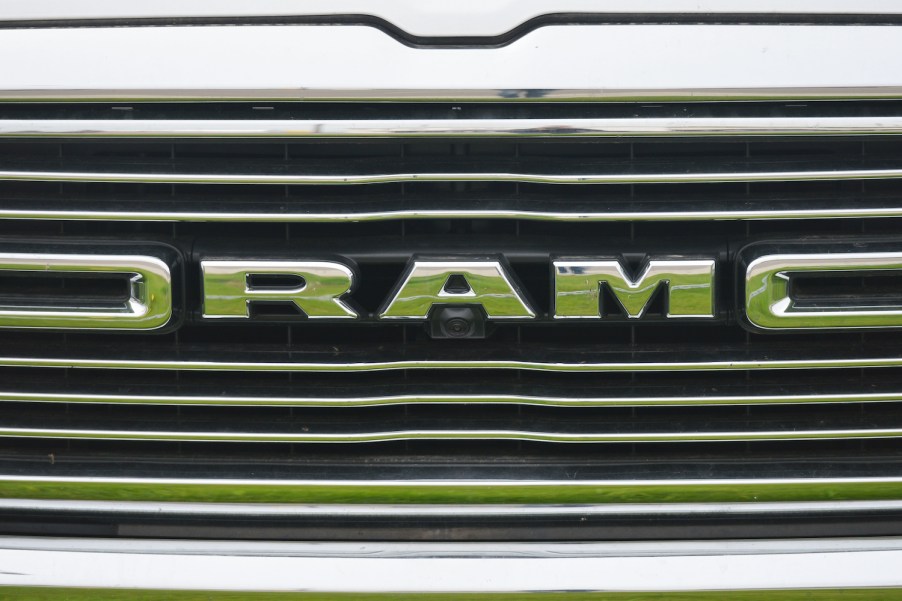
What Do the Letters RAM Stand For?
Even though the RAM trucks brand capitalizes its name on its pickup grilles, the letters are not an acronym. Ram now refers to the male longhorn sheep that have become the automaker’s mascot. But the word actually has its origins in a unique technology invented by a Mopar drag race team–in the 1950s.
The Ram Chargers were a drag race team
By 1959, Chevy cars with their big block V8s were dominating the drag strip. Then, over lunch a the Chrysler Engineering Institute (CEI), 20 students challenged each other to engineer a Mopar that could beat the Chevies at the races. They each threw in $30, bought a 1949 Plymouth coupe, and got to work building a race car in their spare time.

The students knew they had the advantage of a HEMI engine. They began experimenting with special, “long-horn” intakes to better mix the air and fuel.
Ram had been an advertising term for some high-output Chrysler engines from the first-generation HEMI in the 1950s. These cars, such as the early 1960s Chrysler 300s, used “Ram induction.” The race team built on this technology to invent a new type of “Ram” air intake. This also gave their club a name, the “Ramchargers,” according to AllPar.com.
The Ramchargers race team used science to dominate the drag strip throughout the 1960s. They developed such advanced speed technology that the HEMI V8 is still used in drag racing today. Though the team was never officially part of Chrysler Corporation, the company capitalized on its notoriety by folding the words Ram and Charger into its vehicle offerings.
The Dodge Ramcharger was also an SUV nameplate

In 1974, Dodge launched an all-new truck-based SUV. The full-size, 2-door was available with powerful V8s out of Dodge muscle cars and 4WD. The Plymouth version was called the “Trail Duster” (a play on the Plymouth Duster’s name). And the Dodge version was called the “Ramcharger” (a play on the Dodge Charger’s name). The automaker continued building some form of the Ramcharger until the 1993 model year.
What was the first Ram truck?

Dodge has been building pickup trucks for over 100 years. But in 1981, it renamed its pickup truck line the Dodge Ram series. This was a pivotal moment in the history of Ram trucks, the first official use of the name that would come to represent the entire brand. So why did Chrysler Corporation do it?
Was the use of “Ram” a callback to the “Ram” induction systems that had defined generations of Dodge muscle cars? Or was it to connect the truck with the Ram Charger SUV? Or was it even a callback to the Ram Charger race team? Perhaps the reason Dodge’s marketing team chose the word was how well it tied together multiple aspects of the company.
In the following decades, Dodge Ram trucks made the word “Ram” its own. It doubled down on its new branding with hood ornaments and model names such as the “Power Ram.”
In 2009, Chrysler Corporation split Dodge and Ram into separate, parallel brands. Today, Ram trucks–alongside Dodge–is one of the 16 brands that form Stellantis. It shares technology with Dodge as well as Chrysler and Jeep. Ram products include the half-ton 1500, the heavy-duty Ram 2500 and 3500, professional-strength chassis cab trucks, and the ProMaster vans.
What is a RAM?
A Ram is a male sheep. Even though the Dodge Ram was originally named for a high-performance air intake, Ram trucks has adopted a fearsome bighorn sheep as its logo.

This capable, fierce, and distinctly American animal is a perfect symbol for the truck brand. Bighorn sheep nimbly climb the mountains of Yosemite and the Grand Tetons. When the Rams fight, the sound of them headbutting one another echoes for miles.
Some trims of the Ramcharger SUV actually wore a fearsome bighorn Ram hood ornament. When Dodge founded its Ram truck lineup, it carried over this hood ornament. Today, you can even find a modern version of the longhorn Ram ornament on rare, special edition trucks.
Next, find out the most popular theories on the origins of the word Jeep (they include WWI military nomenclature and a popular cartoon character), or learn more about the history of Dodge trucks in the video below:
You can also learn about the future of Ram trucks from the brand’s CEO himself in this final video:







